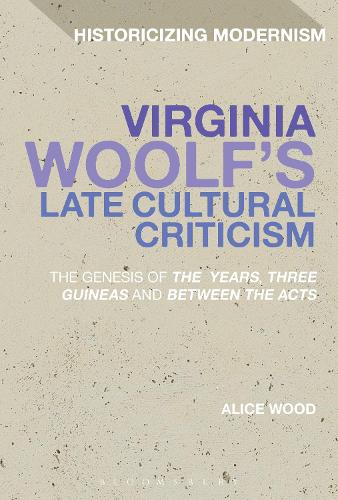
Virginia Woolf's Late Cultural Criticism: The Genesis of 'The Years', 'Three Guineas' and 'Between the Acts'
(Paperback)
Available Formats
Publishing Details
Virginia Woolf's Late Cultural Criticism: The Genesis of 'The Years', 'Three Guineas' and 'Between the Acts'
By (Author) Dr Alice Wood
Bloomsbury Publishing PLC
Bloomsbury Academic
26th February 2015
United Kingdom
Classifications
Tertiary Education
Non Fiction
Literary studies: fiction, novelists and prose writers
823.912
Physical Properties
Paperback
208
Width 156mm, Height 234mm
299g
Description
After the Modernist literary experiments of her earlier work, Virginia Woolf became increasingly concerned with overt social and political commentary in her later writings, which are preoccupied with dissecting the links between patriarchy, patriotism, imperialism and war. This book unravels the complex textual histories of The Years (1937), Three Guineas (1938) and Between the Acts (1941) to expose the genesis and evolution of Virginia Woolfs late cultural criticism. Fusing a feminist-historicist approach with the practices and principles of genetic criticism, this innovative study scrutinizes a range of holograph, typescript and proof documents within their historical context to uncover the writing and thinking processes that produced Woolfs cultural analysis during 1931-1941. By demonstrating that Woolfs late cultural criticism developed through her literary experimentalism as well as in response to contemporary social, political and economic upheavals, this book offers a fresh perspective on her emergence as a cultural commentator in her final decade and paves the way for further genetic enquiries in the field.
Reviews
Alice Woods Virginia Woolfs Late Cultural Criticism: The Genesis of The Years, Three Guineas and Between the Acts illuminates the formation of Virginia Woolfs last three major works within larger literary and historical contexts. Woods approach to Woolfs writings is refreshing, which integrates 'feminist-historicist' analysis with genetic criticism, a French school of textual studies that reconstructs the genesis of literary texts through published and pre-publication materials, or what geneticists have called 'avant-textes' (pre-texts) Examining an extensive gathering of sources, ranging from Woolfs reading notes, research scrapbooks, holograph and typescript drafts, manuscripts, and proofs to her diaries, essays, and correspondence, Wood deftly synthesizes critical interpretations of Woolfs evolving aesthetic practices and political stance with detailed analysis of authorial considerations under the influence of contemporary writing and political climate in the last decade of Woolfs life. * Journal of Modern Literature *
Author Bio
Alice Wood is Lecturer in English Literature at De Montfort University, UK.
